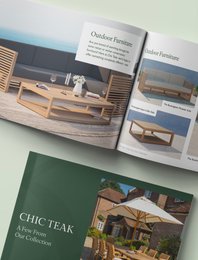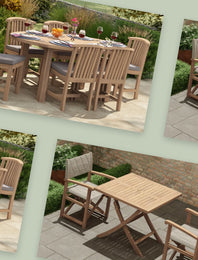
The Chic Teak Guide to Creating a Sustainable Garden
We’re all trying to do our bit to make the world a better place and limit the effect our actions have on climate change. Recycling and limiting car journeys are often the first steps we take, but looking to our gardens and making changes there are some of the simplest yet most positive changes we can make to benefit our planet - whilst also creating beautiful gardens. In this post we have given our simple recommendations to achieving a more sustainable garden for those who are both green fingered, and green minded!
Compost
Adding a compost bin to a small spot in your garden offers an excellent way to not only recycle certain food and garden waste and reduce your household waste, but also produce nutrient-rich compost that your garden will love and thrive off. It is important to ensure a mix of fruit and vegetable waste, alongside roughage such as egg boxes and egg shells, as adding too much of one thing (such as grass cuttings) will result in less efficient compost production.
If a compost bin isn’t for you and you need to buy compost, remember to opt for a peat-free variety as peat is not a sustainable resource. Sustainable alternatives to peat include wood fibre and coconut fibre. However, we must admit that using your own homemade compost is best when you can. Simply dig out from the bottom of your compost bin to find the best rich, dark compost.
Control pests naturally
The global overuse of harsh pesticides has resulted in a huge reduction in the amount of insects seen in the garden and around the world. This not only impacts further up the food chain, but insects are pollinators and recycle valuable nutrients, and without them huge areas of everyday life are affected. It can be frustrating when unwelcome bugs eat away at your plants, but before you turn to damaging chemicals, there are other, more sustainable ways to deter these pests.
One simple way to deter unwanted pests is to companion plants that are mutually beneficial to each other side by side. An example of this is to plant french marigolds alongside plants that are generally susceptible to greenfly and blackfly as marigolds emit a strong odour that acts as a deterrent against these pests.
Other benefits of companion planting include adding beneficial nutrients to the soil and attracting pollinating insects.
Save Water
This one is quite simple, but reducing the amount of fresh water you use around the garden is one of the easiest ways to promote a more sustainable garden. Plants are picky when it comes to water, and don’t care for completely clean, fresh water straight from the tap, and that’s why we would recommend installing a water butt in your garden. Make the most of the wet winters (and often summers too!) by installing a water butt to the downpipe of your guttering to collect excess rainwater - perfect for giving plants a drink and watering the grass in the summer too - plus it’ll save on your water bills!
Furniture
Last but not least, choosing to purchase sustainable furniture pieces to use in our gardens is another great way to promote sustainability and protect the environment. Teak is an excellent choice for garden furniture due to its natural resistance to changing weather conditions and pests. Although it can be pricier than other materials, it’s durability means it will last you a lifetime.
The added benefit our teak is that it is sourced from ecologically managed and sustainable plantations which hold a SVLK certificate (Timber Legality Assurance System) and a FLEGT License which guarantees the teak stock is well managed and serves to alleviate the stress of the world's tropical forests. The world's forests are rapidly declining, but making these simple changes can help to reduce the impact we are having.
We hope that we have been able to offer some simple steps to promote a more sustainable garden. If you have any questions on the sustainability of our teak, please feel free to get in touch and we’ll be happy to help.




